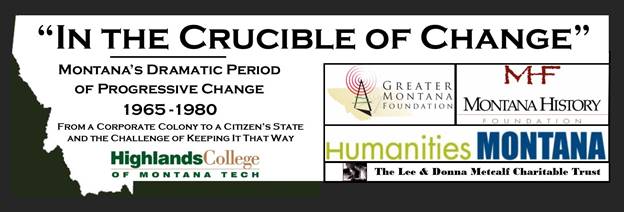
Document Type
Transcript
Publication Date
Fall 2015
Abstract
One-hundred years ago, in 1914, male voters in Montana (MT) extended suffrage (voting rights) to women six years before the 19th Amendment to the US Constitution was ratified and provided that right to women in all states. The long struggle for women’s suffrage was energized in the progressive era and Jeanette Rankin of Missoula emerged as a leader of the campaign; in 1912 both major MT political party platforms supported women suffrage. In the 1914 election, 41,000 male voters supported woman suffrage while nearly 38,000 opposed it.
MT was not only ahead of the curve on women suffrage, but just two years later in 1916 elected Jeanette Rankin as the first woman ever elected to the United States Congress. Rankin became a national leader for women's equality. In her commitment to equality, she opposed US entry into World War I, partially because she said she could not support men being made to go to war if women were not allowed to serve alongside them. During MT’s initial progressive era, women in MT not only pursued equality for themselves (the MT Legislature passed an equal pay act in 1919), but pursued other social improvements, such as temperance/prohibition. Well-known national women leaders such as Carrie Nation and others found a welcome in MT during the period. Women's role in the trade union movement was evidenced in MT by the creation of the Women's Protective Union in Butte, the first union in America dedicated solely to women workers.
But Rankin’s defeat following her vote against World War I was used as a way for opponents to advocate a conservative, traditionalist perspective on women's rights in MT. Just as we then entered a period in MT where the “copper collar” was tightened around MT economically and politically by the Anaconda Company and its allies, we also found a different kind of conservative, traditionalist collar tightened around the necks of MT women. The recognition of women's role during World War II, represented by “Rosie the Riveter,” made it more difficult for that conservative, traditionalist approach to be forever maintained. In addition, women's role in MT agriculture – family farms and ranches -- spoke strongly to the concept of equality, as farm wives were clearly active partners in the agricultural enterprises. But rural MT was, by and large, the bastion of conservative values relative to the position of women in society.
As the period of “In the Crucible of Change” began, the 1965 MT Legislature included only three women. In 1967 and 1969 only one woman legislator served. In 1971 the number went up to two, including one of our guests, Dorothy Bradley. It was only after the Constitutional Convention, which featured 19 women delegates, that the barrier was broken. The 1973 Legislature saw 9 women elected. The 1975 and 1977 sessions had 14 women legislators; 15 were elected for the 1979 session. At that time progressive women and men in the Legislature helped implement the equality provisions of the new MT Constitution, ratified the federal Equal Rights Amendment in 1974, and held back national and local conservatives forces which sought in later Legislatures to repeal that ratification. As with the national movement at the time, MT women sought and often succeeded in adopting legal mechanisms that protected women’s equality, while full equality in the external world remained (and remains) a treasured objective.
The story of the re-emergence of Montana’s women’s movement in the 1970s is discussed in this chapter by three very successful and prominent women who were directly involved in the effort: Dorothy Bradley, Marilyn Wessel, and Jane Jelinski. Their recollections of the political, sociological and cultural path Montana women pursued in the 1970s and the challenges and opposition they faced provide an insider’s perspective of the battle for equality for women under the Big Sky “In the Crucible of Change.”
Recommended Citation
Bradley, Dorothy; Jelinksi, Jane; Wessel, Marilyn; and Barrett, Evan, "Transcript for Episode 31: Past is Prologue: Montana's Historic Women's Movement Re-emerges in the Progressive 1970s - In the Crucible of Change" (2015). Crucible Episode Transcripts (old). Paper 29.
http://digitalcommons.mtech.edu/crucible_transcripts/29
